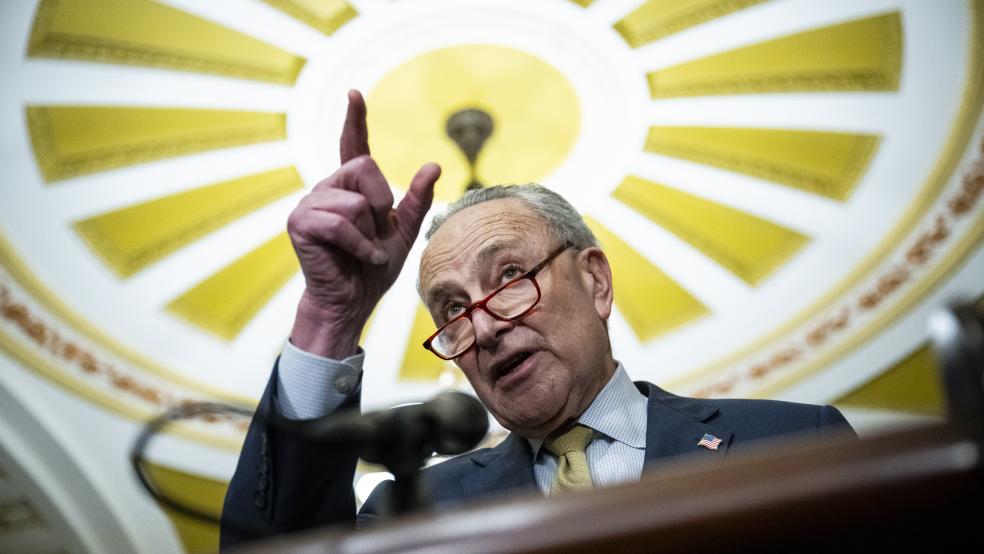House Speaker Mike Johnson and Senate Majority Leader Chuck Schumer announced Sunday that they have reached an agreement setting the topline discretionary spending level for the 2024 fiscal year. The announcement reduces the odds of a partial government shutdown in less than two weeks — but does not eliminate the possibility. Key details still need to be ironed out as lawmakers race to craft appropriations bills before funding deadlines on January 19 and February 2.
The agreement’s topline includes $1.59 trillion in discretionary spending, plus a “side deal” agreed to earlier this year that provides an additional $69 billion in spending in non-defense areas. Overall defense spending is set at $886 billion, a small increase from 2023, while non-defense spending including the side deal comes to $773 billion, basically flat year-over-year. Discretionary spending would total $1.66 trillion.
“After many weeks of dialogue and debate, we have secured hard-fought concessions to unlock the FY 24 topline numbers and allow the Appropriations Committee to finally begin negotiating and completing the twelve annual appropriations bills,” Johnson said in a Sunday letter to his Republican colleagues.
Senate Majority Leader Chuck Schumer and House Democratic Leader Hakeem Jeffries portrayed the deal as a win that would maintain funding for their party’s recent legislative achievements and could avoid a shutdown. The White House said it also welcomed the agreement. “The bipartisan funding framework congressional leaders have reached moves us one step closer to preventing a needless government shutdown and protecting important national priorities,” President Joe Biden said in a statement. He also said it’s time for Republicans to “do their job, stop threatening to shut down the government, and fulfill their basic responsibility to fund critical domestic and national security priorities, including my supplemental request.”
A familiar number: The topline number essentially preserves the level codified in the Fiscal Responsibility Act, which also suspended the federal debt limit until 2025, ending the debt-ceiling crisis in June.
The new agreement provides about $16 billion in cuts relative to the FRA — a rounding error in the context of the overall package, but a number that Johnson can point to as he tries to sell the agreement to House conservatives, who have lobbied for more dramatic spending reductions. About $6 billion of the cuts come from the recovery of unspent Covid-19 relief funds, with the rest coming from funding that was supposed to go to the IRS, as a $10 billion funding reduction scheduled for 2025 is moved into the current year.
Right wing not pleased: Far-right members of the House have criticized the agreement, which is basically the same as the one that cost former Speaker Kevin McCarthy his job in October.
The House Freedom Caucus called the deal “a total failure” and said it was “totally unacceptable.” Rep. Marjorie Taylor Greene, the outspoken Republican from Georgia, said she is “a NO to the Johnson Schumer budget deal.” The agreement “does nothing to secure the border, stop the invasion, or stop the weaponized government targeting Biden’s political enemies and innocent Americans,” she claimed.
Conservative Republicans are expected to attempt to add policy riders to the appropriations bills in an effort to win victories on issues such as abortion and curtailing “woke” policies in the federal government. That could complicate the effort to pass the bills quickly. Schumer said in his statement that “we have made clear to Speaker Mike Johnson that Democrats will not support including poison pill policy changes in any of the twelve appropriations bills put before the Congress.”
Trouble ahead? To pass the spending deal and avoid conflict over controversial policy issues, the House will likely have to consider the bills under suspension of the rules, which would deny members the ability to add riders, but also raise the requirement for passage to two-thirds — meaning any bill would require substantial support from both parties.
Given the extraordinarily tight timeline, lawmakers may also need to pass another short-term funding extension ahead of the shutdown deadlines — something Johnson has vowed not to do.
However the appropriations bills move through the House, Johnson could find himself in a similar position to McCarthy, who failed as he tried to find a balance between legislation that could actually get through Congress and legislation that would please his conservative base. As things stand, Johnson will need help from Democrats to pass the spending packages, and such a bipartisan approach could anger his fellow conservatives and spark a rebellion of the type that took McCarthy down.
On the other hand, House Republicans may not want to see a repeat of the chaos surrounding the effort to find a new speaker. And there appears to be a growing awareness that divided government means lawmakers have to make compromises. “Are we learning that negotiating with the Democrats in the White House and Senate with a slim majority is hard and you can’t get everything you want, no matter who is in the Speaker’s office?” Rep. Mike Collins, a Republican from Georgia, asked on social media.
The bottom line: An agreement on topline spending is a good sign for a full-year appropriations package and avoiding a government shutdown, but there are likely to be bumps in the road ahead, and a shutdown cannot be ruled out completely.




